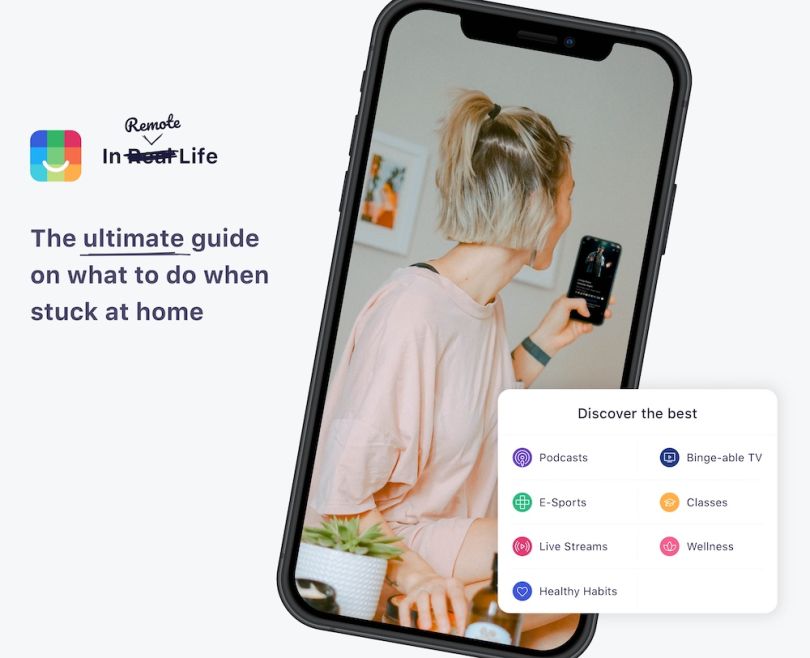Abraham Shafi, chief executive of IRL, co-founded the social-calendar-app company with the goal of bringing people together. But when California, where IRL is headquartered, and other states began discouraging events because of the coronavirus, he knew the company had to change direction.
In the weeks that followed, IRL pulled all in-person activities from its platform. It made room for virtual events, which it pushed to the forefront. Now, the browsing page is filled with Twitch streams, TV show watch parties and virtual DJ sets.
The company kept its name — originally an abbreviation for “in real life” — since the middle initial works just as well for “remote.” Currently, IRL is the 150th most-popular app in the App Store, in between Domino’s Pizza and Google Earth.
“I see companies as living organisms,” Shafi told Built In. “And I think the most important quality of living organisms is adaptability to its changing environment.”
For companies focused on event discovery and activity planning, the pandemic and resulting stay-at-home orders pose a threat to survival. (One Silicon Valley advisor called this moment “the great unwinding” for startups.) But some have responded by adapting their products in order to meet the needs of people looking for connection and community within socially distanced confines.
“The most important quality of living organisms is adaptability to its changing environment.”
“We only really allowed [online connections] in one-off cases in the past. It was fairly frowned upon for a long time,” David Siegel, chief executive officer of Meetup, a platform for organizing groups and events, told The Drum. In that article, Siegel said that, since Meetup began encouraging virtual events on March 6, more than 10,000 of its platform’s meetings have taken place online.
Evite, the online invitation company, rolled out a new COVID-19 landing page. “Evite now supports virtual connection in two ways,” the page reads, before highlighting features like video chats and video cards.
People are still scheduling times to socialize, even if they can’t go out. They “gather” to watch musicians perform sets online, attend conferences virtually and enjoy happy hours over Zoom. Not all event-scheduling platforms will dissolve, but they will need to evolve — by tailoring messaging and tweaking features to accommodate the new reality.

THE BIG SHIFT
When restaurants, bars, clubs, conferences and festivals got canceled, the old way of organizing events around physical space got disrupted. But many people still have time on their hands — and an internet connection.
“A calendar is all about how you spend your time. So the product in and of itself is rooted in helping people manage their time,” IRL’s Shafi said. “If their time is stuck indoors, how do we help them do that?”
In fact, to IRL’s users, the selection of things to do has never been bigger.
“There’s actually so much content now because all the artists, comedians, all their tour dates got canceled, they’re all at home — and they all still want to entertain people!” Shafi said.
IRL previously populated users’ discovery pages with curated events relevant to their geography, which they could then add to their calendar. Now it’s focused on enhancing their ability to sift through the flood of virtual activities — livestreams happening on Twitch, YouTube, Facebook, Instagram — which has meant the company has had to pivot away from its location-first approach and think globally.
That “has been the most fun and hardest thing,” Shafi said. “All of our ranking-sorting algorithms now need to be modified and updated. It’s a completely different set of variables you’re accounting for now.”
IRL also added the ability for users to subscribe to “healthy habits” calendars. “All of us are shook right now because our habits and rituals” are gone, Shafi said. So his app is pushing wellness routines, and even reminders to FaceTime a friend. These ideas “seem so simple, but they're incredibly powerful,” he added.
Meetup, too, has experienced a change in user behavior on its site due to social distancing. Sports and outdoor groups, for example, have fallen off in recent weeks, a company spokesperson told Built In over email. Tech-related meetings, though, are still a top category on the site: “These Meetup organizers and members, perhaps because they have a natural interest in technology, have easily shifted to online video platforms and webinar formats,” the spokesperson said.
“Our chats have gone up fivefold from where they were pre-coronavirus.”
With a change in user behavior comes the need to offer new tools.
Even though “the heart of Meetup’s mission centers around bringing people together in person,” according to chief exec Siegel’s March 6 statement, the company has adapted to the moment. It’s published blog posts and hosted webinars that share pointers on how to host meetings online and use popular tools like Zoom and Google Hangouts.
Evite is also adapting to the times. It recently introduced a video chat functionality for its virtual invitations. When users build their invites, they can choose to host a virtual event by using the default option provided through Evite, or by adding a URL to another video chat service.
WITH PIVOTS COME NEW POSSIBILITIES
It goes without saying that the coronavirus and its ripple effects have not been a welcome intrusion for anyone. But the pressure to adjust course has given these companies a vision of new opportunities.
“Now that Meetup events are open to anyone with an online connection, we have seen unique cases of people connecting like never before,” the Meetup spokesperson told me. “A Meetup Pro Google Developer Group had RSVPs from 25 countries representing 51 cities to their online event.”
Previously they reached only two nearby cities.
“Our chats have gone up fivefold from where they were pre-coronavirus,” Shafi said of IRL, which allows users to chat within the app about various events. “They’re using the calendar much less as a simple reminder and discovery tool and now much more of an engagement tool — in terms of chatting with their friends a ton.”
But what happens after the quarantine ends?
“Now that Meetup understands how its communities are adapting to online events, the platform has decided to make them a permanent fixture,” The Drum reported, noting that it will offer online and hybrid events for organizers going forward.
“After this whole thing subsides, our remote content will stay. It’ll just be hybrid, sort of like ‘choose your own adventure,’” Shafi said of IRL’s post-COVID-19 future. “So if you want to get remote content, we’re still going to have that discoverability.”
“I think whatever new world we get into, it’s not going to be exactly the same as the old world we just left,” he said. “So it’s going to be really interesting to see how it all evolves.”




